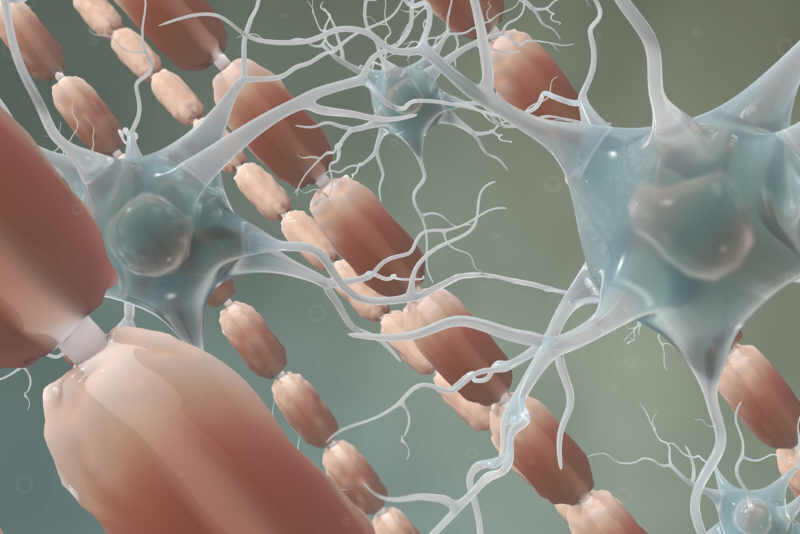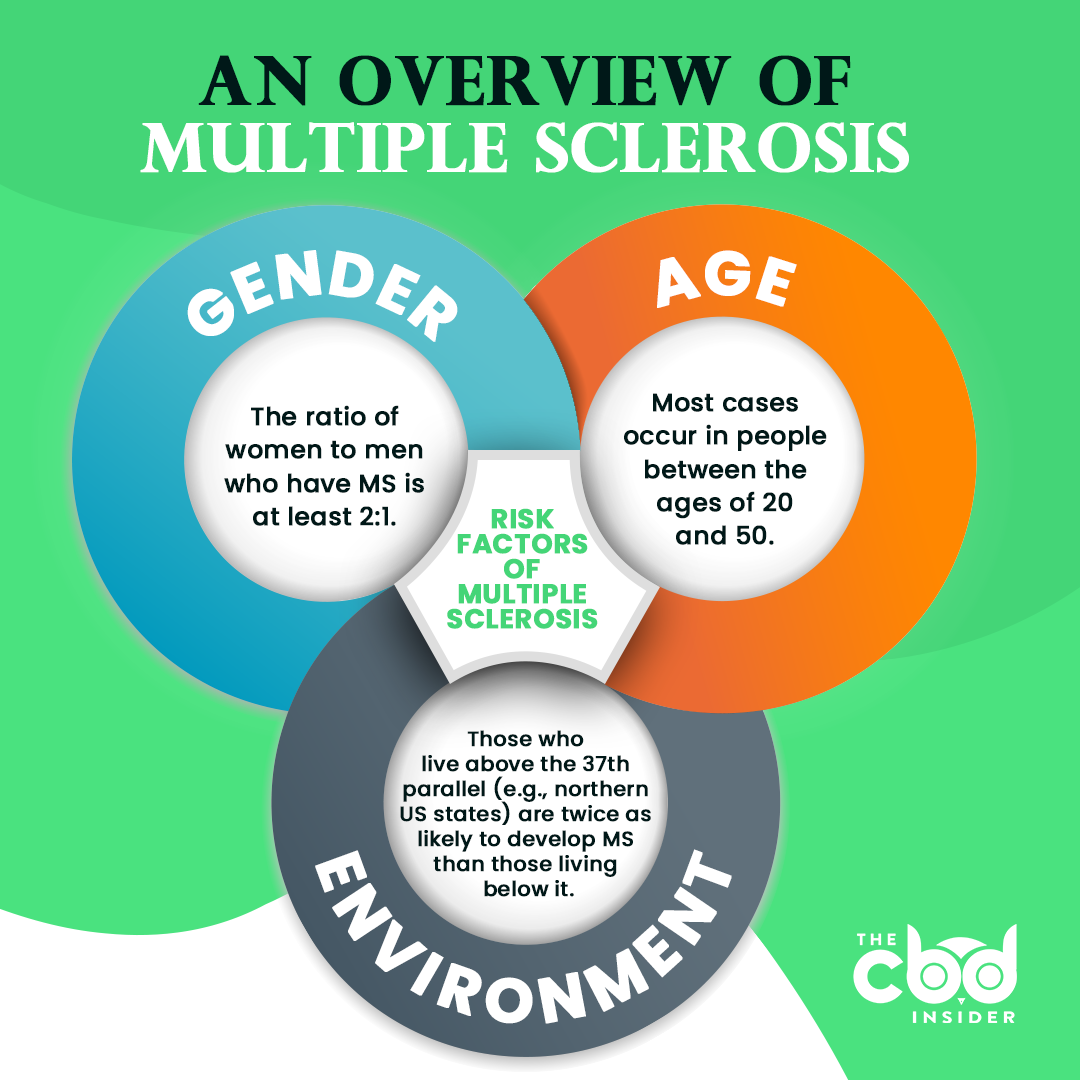-
- Market Research
- |
- CBD Near Me
- |
- Giveaways
- |
- Newsletter
- |
- Contact
- |
- Advertise
- |

Table of Contents
- An Overview of Multiple Sclerosis
- Multiple Sclerosis Symptoms
- Multiple Sclerosis Medication
- How Multiple Sclerosis Works
- CBD Treatment of MS in Trials and Studies
- Sativex for Neuropathic Pain in Multiple Sclerosis Patients
- Evaluation of Sativex for Pain Management in Multiple Sclerosis
- Multiple Sclerosis Patients Smoke Cannabis to Treat Spasticity
- How CBD Treats MS
- Sativex May Help
- CBD Is a Viable Treatment for MS
With many patients finding little to no respite from their multiple sclerosis (MS) with traditional medication, cannabinoids, including CBD, are becoming an alternative treatment. Backed by the evidence of several clinical trials and studies, researchers are recognizing the viability of CBD and its fellow cannabinoids as a safe, efficacious treatment. The evidence provides hope for MS patients who have not had success with traditional medications or are experiencing adverse effects from medication.
Table of Contents
- An Overview of Multiple Sclerosis
- Multiple Sclerosis Symptoms
- Multiple Sclerosis Medication
- How Multiple Sclerosis Works
- CBD Treatment of MS in Trials and Studies
- Sativex for Neuropathic Pain in Multiple Sclerosis Patients
- Evaluation of Sativex for Pain Management in Multiple Sclerosis
- Multiple Sclerosis Patients Smoke Cannabis to Treat Spasticity
- How CBD Treats MS
- Sativex May Help
- CBD Is a Viable Treatment for MS
An Overview of Multiple Sclerosis
About 2.5 million people around the world suffer from MS, with more than 400,000 MS patients in the U.S.
On average, 200 cases of MS are diagnosed each week in America.
Although the causes of MS are unknown, several factors may increase an individual’s risk of developing the disease.
Those who live above the 37th parallel (e.g., northern US states) are twice as likely to develop MS than those living below it.
The ratio of women to men who have MS is at least 2:1, putting women at a considerably higher risk.
Age may also be a factor, as most cases occur in people between the ages of 20 and 50.
Multiple sclerosis is a disease where the immune system eats away the protective lining around nerve cells called myelin.
MS is named after the many scars that appear on the myelin coverings as they are damaged.
The damage impairs the central nervous system’s functions, leading to a myriad of complications.
Multiple Sclerosis Symptoms
Some patients may have few or no symptoms at all, while others might have lifelong chronic symptoms.
MS symptoms can include:
- Sensory pain
- Fatigue
- Double vision
- Balance problems
- Muscle spasms
- Vertigo
- Dizziness
- Bowel dysfunction
- Depression
As the disease progresses, symptoms may become more severe. If not appropriately treated or if treatment fails, MS can lead to paralysis, epilepsy, and other serious complications.
Multiple Sclerosis Medication
Medications are not able to stop or reverse the damage caused by MS, but they can help slow down its progress and managing pain.
However, the side effects caused by such medications can add to the complications instead of taking them away.
Long-term effects of MS medication include:
- More or intensified nerve pain
- Weakened immune system
- Depression
- Gastrointestinal problems
Unfortunately, some MS patients find no relief with medication and may only feel worse as a result of the side effects.
For those who cannot find relief, CBD may be a more effective, safer form of treatment.
How Multiple Sclerosis Works
MS begins when the myelin protecting the brain and spinal cord is attacked by the immune system, leading to the weakening of the blood-brain barrier and inflammation around the brain.
The inflammation produces cells that cause damage to the brain and nerve tissue.
The damage results in poor communication between the central nervous system and the rest of the body, causing the symptoms an MS patient experiences.
As MS progresses, some patients experience persistent nerve deterioration and pain, while others have episodic patterns where symptoms resolve and then return, called relapsing-remitting MS.
There are a couple of theories concerning the cause of MS.
One theory says MS is caused by a combination of genetics, a non-genetic trigger such as low vitamin D, and environmental factors.
Another theory proposes that some neurons become defective, causing the immune system to attack in an attempt to remedy the problem.
CBD Treatment of MS in Trials and Studies
CBD, usually in combination with other cannabinoids, has been studied to assess its effectiveness in treating neurological pain, spasticity, and slowing the progression of MS.
The results suggest that CBD may be a viable candidate for treatment.
Sativex for Neuropathic Pain in Multiple Sclerosis Patients
In a two-year trial conducted by the Walton Centre for Neurology and Neurosurgery in the UK, 66 MS patients were either given a THC and CBD (with a ratio of approximately 1:1) oral spray called Sativex or a placebo.
Assessments throughout the trial concluded the spray was effective in relieving neuropathic pain while side effects, mainly dizziness and nausea, were mild or moderate.
Evaluation of Sativex for Pain Management in Multiple Sclerosis
A clinical study performed by IRCCS Centro Neurolesi “Bonino-Pulejo,” a medical clinic in Italy, had twenty MS patients, ten with pain and ten without, undergo four weeks of treatment with Sativex to assess the product’s effectiveness in pain management.
After the four weeks, Sativex was reported to decrease patients’ pain and improve their quality of life.
Multiple Sclerosis Patients Smoke Cannabis to Treat Spasticity
In a study by UC San Diego, researchers tested CBD’s effectiveness against spasticity (muscle spasms, stiffness) in MS patients.
Thirty patients were either given cannabis to smoke or placebo cigarettes. After treatment concluded, the patients switched.
When patients smoked cannabis, they reported an average reduction of 2.74 points on the modified Ashworth scale, an instrument for measuring spasticity.
They also reported an average 5.28-point reduction in pain according to a visual analogue scale.
The study concluded that cannabis was extremely effective in reducing spasticity and easing the pain.
How CBD Treats MS
CBD potentially treats multiple sclerosis by suppressing glutamate, protecting neurons, relieving nerve pain, reducing inflammation, reducing spasticity, and preventing anxiety and depression.
CBD Suppresses Glutamate
Glutamate is a neurotransmitter, a chemical that helps nerves send their signals to other nerves.
However, when the body overproduces glutamate, as is the case in MS, it can kill nerve cells and cause inflammation, causing the nervous system to deteriorate.
Glutamate is also responsible for overstimulating receptors and leading to worsened symptoms, as well as long-term debilitation.
Glutamate can also cause spasticity, neuropathic pain, and excitotoxicity.
Thus, if glutamate levels are returned to homeostasis, MS patients may find a level of relief.
Fortunately, CBD can suppress glutamate production, decreasing neuropathic pain and reducing inflammation.
CBD Protects Neurons
The destruction of nerve cells and myelin-producing cells, also known as excitotoxicity, is one of the most significant factors in the progression of MS.
Two significant contributors to excitotoxicity are oxidation and over-produced chemicals such as glutamate.
When glutamate and other chemicals are produced in excess, they cause damage to nerves and lead to their eventual death.
Oxidation also produces damage to neurons and creates a chain reaction causing more harm.
According to a study from a hospital in Spain, CBD can protect neurons and slow down the processes which would cause neuron damage and death.
As a result, CBD can improve the brain’s ability to function and relieve cognitive symptoms associated with MS.
CBD has also been proven to be an antioxidant, preventing further damage caused by oxidation in the nervous system.
With these properties, CBD can slow the progress of MS and help patients feel better for longer.
CBD Relieves Nerve Pain
One of the most common symptoms of MS is nerve pain.
This pain comes from the deterioration of neurons by the immune system.
The leading causes are inflammation caused by glutamate and other chemicals as well as nerve receptors becoming overly sensitive, leading to a patient’s perception of pain.
CBD can relieve pain by binding to specific cannabinoid receptors called CB2 receptors.
These receptors are primarily found on immune cells.
When CBD stimulates the CB2 receptors on immune cells, it kills cells that cause inflammation, relieving pain.
CBD may also reduce nerve pain by interacting with other receptors responsible for the perception of pain.
When CBD suppresses glutamate, it protects these receptors from overactivation, leading to potential relief of nerve pain.
CBD Reduces Inflammation
Inflammation is another complication caused by MS.
It stems from the immune system producing cytokines as it attacks nerve cells.
Cytokines prevent the absorption of glutamate, promoting the issues excess neurotransmitters cause.
This property makes cytokines responsible for inflammation, another source of pain in MS patients.
CBD has been shown to reduce the inflammation caused by immune cells that release cytokines.
For example, it has been shown to speed up the natural death of immune cells.
CBD also suppresses the antibodies produced by the immune system that break down myelin and worsen inflammation.
In addition, CBD protects the cells that create myelin by reducing tumor necrosis factor, an abundant cytokine which causes inflammation and destroys myelin-producing cells.
Some MS patients also deal with gastrointestinal inflammation. As a result of nerve damage, the gastric motility (i.e., movements of the digestive system) of patients can experience abnormalities.
According to a study by the Department of Experimental Pharmacology at the University of Naples Federico II in Italy, CBD can reduce inflammation and prevent diarrhea by normalizing gastric motility.
CBD Reduces Spasticity
Spasticity is caused by damage to neurons and the resulting poor communication from the central nervous system.
Symptoms can include muscle weakness, stiffness, involuntary muscle movement, and pain.
Studies, such as the one conducted by UC San Diego, have illustrated CBD’s effectiveness in controlling spasticity and easing the complications associated with MS.
CBD promotes the levels of anandamide, an endocannabinoid which helps control spasticity throughout the body.
Anandamide suppresses the production of glutamate to slow continuous nerve damage, preventing spasms.
CBD helps anandamide last longer in the body by slowing down its breakdown.
Consequently, spasticity may be significantly reduced by treatment with CBD.
CBD Prevents Anxiety & Depression
As a result of the chemical imbalance caused by MS, several patients can be emotionally affected.
This can lead to anxiety and depression, requiring further medication.
Fortunately, a study by the Federal University of Rio de Janeiro in Brazil has shown CBD to be effective at relieving anxiety and depression as well.
CBD, a non-psychoactive compound, combines with specific receptors to produce antidepressant properties without serious side effects and no psychological alteration.
Sativex May Help
Sativex, also known as nabiximols, is developed by GW Pharmaceuticals, a UK-based biopharmaceutical company founded in 1998 that also operates in the US.
The treatment was created to reduce spasticity in MS patients.
It was first approved by the UK in 2010 and has since received marketing authorization in 21 European countries.
Sativex is not currently available in the US, but it is awaiting FDA approval.
Many of the studies testing CBD’s effects, such as the ones mentioned above, have used Sativex.
This product combines THC and CBD to treat patients.
THC combines with CB1 receptors which are responsible for pain management, yet also leads to psychoactive effects.
However, CBD is non-psychoactive and can negate the psychoactive aspect of THC.
Together, both CBD and THC can be an effective treatment for MS patients.
A study conducted by a collaboration of Italian universities and hospitals has shown that Sativex is useful for treating spasticity.
Over 1,600 participants took Sativex, and 70.5 percent found some level of relief from spasticity after a month of treatment.
The study concluded that Sativex is effective for moderate to severe spasticity.
The side effects of Sativex have been reported as mild to moderate, with the most common being dizziness and nausea.
In comparison to the potential side effects of medication such as gastrointestinal problems, depression, among many other severe complications, Sativex is a much more attractive alternative.
Additionally, studies conclude that Sativex is not only an effective treatment but also safe, especially for those who have not found relief with medication.
CBD Is a Viable Treatment for MS
After multiple studies, researchers suggest cannabinoids like CBD may be a viable treatment for MS patients.
In conjunction with other cannabinoids, CBD consistently proves to retard the progression of multiple sclerosis and help those suffering find relief.
CBD may also reduce the number of medications that patients take, offering fewer adverse side effects.
Especially for those who have not found relief from their MS with medication, CBD may be the answer for improving their quality of life.
Have you or a loved treated multiple sclerosis with CBD? If so, what were the results? Share your experience in the comments below!
Disclaimer: The content on this site is for informational purposes only. We are not medical experts and nothing should be construed as medical advice. Be sure to speak with your physician before taking CBD or any other treatment.













